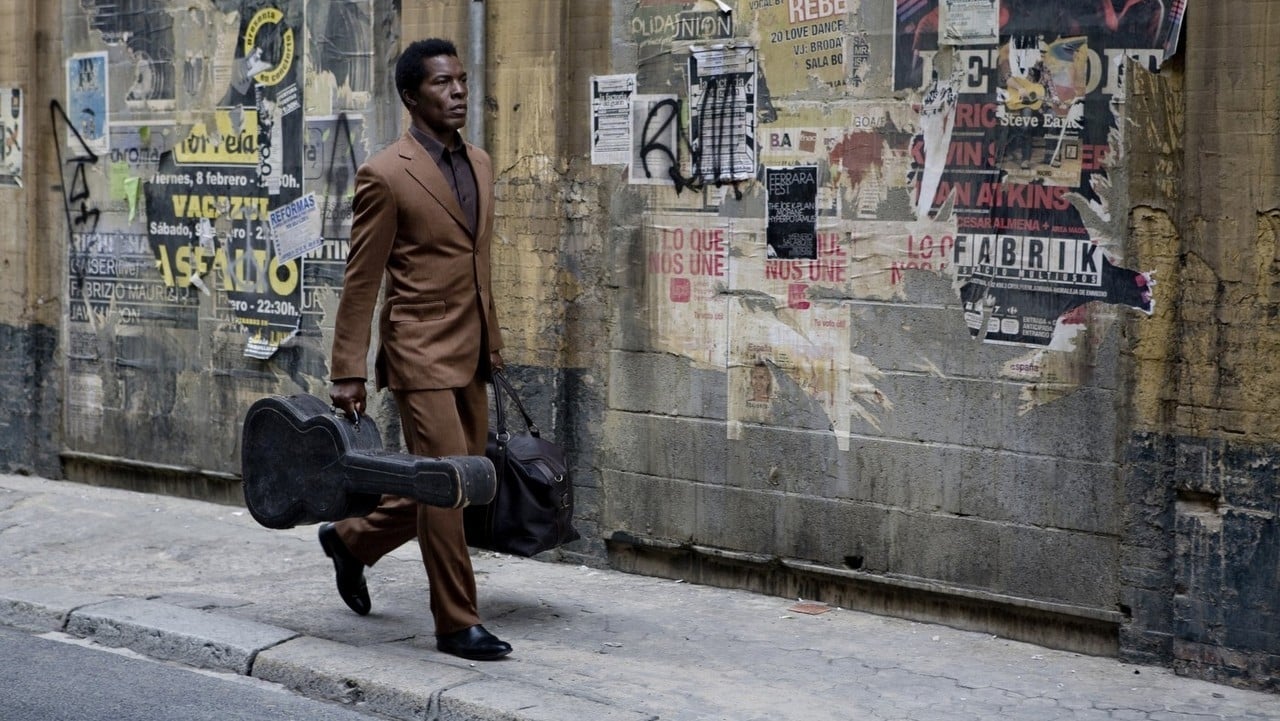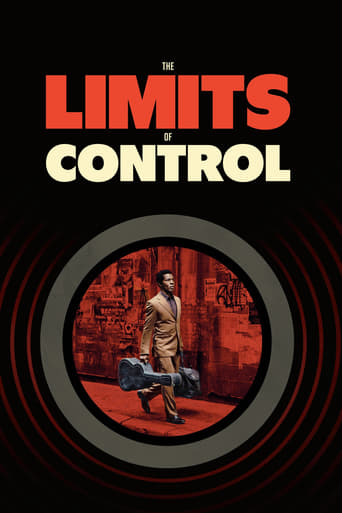

An almost meditative experience with a sprinkle of humour and poetry thats pulls everything together as an excellent minimalist movie. If you are expecting a conventional narrative with plenty of action, this movie could be perceived as boring or vacuous. However, you will be rewarded if you go with the flow of the beautiful cinematography and pacing that helps to explore some interesting philosophical ideas in a visual way. Jarmusch uses repetitive imagery to create a sense of how the main character maintains balance and stability on his unpredictable journey through Spanish landscapes, mysterious strangers and art galleries. The slow and calm pace of the film allows the viewer to experience the main characters discipline, deep focus and intuition. Some great experimental filmmaking here.
... View MoreYes, this film is slow, maybe even painfully stagnant due to long scenes and shots of mundane activates. Yes, it does not have much of a plot. Yes, the dialogue is scarce. However, these should not be reasons to not see a movie. A film can still achieve a lot without a fast plot or lots of chatting. What makes a movie really unwatchable is if it is thoroughly uninteresting, which is what Limits of Control is doubtlessly guilty of being.From the first scene, where two men speak to each other through a translator who does not understand the conversation, Limits of Control hails itself as postmodern with the line "Reality is subjective Reality is arbitrary," From there, the film simply proceeds to tick off a list of stereotypical postmodern themes: subjectivity of reality/human experience, an inability to communicate with others, feeling isolated from the rest of humanity, a plot that refuses to make itself logical to its audience, etc. It even chooses fill most of the movie's runtime with the most boring moments possible: endless minutes of sitting, watching, stretching, and walking. This is a stereotypical postmodern blending of fiction and reality, art that imitates real life. After all, those boring moments are what we, as the audience, fill our days with. As the film continues, the plot repeats over and over the ideas presented in the first half hour, contributing nothing new, even up to the film's conclusion.Ultimately, Limits of Control presents no new interpretations of postmodern ideas. It is textbook, operating off of the same concepts Tomas Pynchon had written about fifty years ago. Unlike films like Rosencrantz and Guildenstern Are Dead, Limits of Control does not play with its ideas, have fun with them, or stack layers of confusion and meaning. It is too self-obsessed with presenting itself as art.P.S. It might be worth mentioning that the only enjoyable part of the movie was the two-minute cameo by Bill Murray. Too bad it was right at the end.
... View MoreA posh dressed paid killer (Isaach De Bankolé) is assigned to fulfill a mission which has to be done in Spain. The protagonist sets off for this country, rambles around and by contacting ensuing messengers he gets closer and closer to his destination The latest film by Jim Jarmusch is one of the most enigmatic efforts he has ever done. This virtually plot less entry in the carrier of Jarmusch aroused a lot of controversy and it was criticized for a little number of conversations as well as was claimed to be pretentious and lacking a coherent story. It isn't difficult to comprehend why it was disliked by the majority of cinephiles since Limits of Control won't be an easy viewing for many. Jim Jarmusch, instead of exploiting a conventional storytelling, provides us with a work of art which defamiliarizes us with the whole plot and pushes it to the backseat, thus one is forced to observe what is going on without any previous foreshadowing and this is how one is introduced to the second meaning of the tale – exploration of reality. "Nothing is true. Everything is imagined" utters one of the messengers. In this way, Jarmusch argues that even though we behold and understand what takes place around us, it cannot be considered to be a truth forasmuch it is filtered by our mentality which is subjective hence possibly contradictory with the reality. Everybody can deem the same occurrence in disparate, sometimes phony, ways. In the flick, there is a great deal of details which might indicate something or simply nothing. At one point, the nameless main hero spots a helicopter in the sky. There is a close-up on the object which later perishes. One never knows if it is anything significant and will have an impact on protagonist's actions in the future, but when this event repeats, it occurs to a viewer that it is somehow connected with the hit-man's mission. Also, the recurring motif of an art exposition which the killer attends seems to be something more than just a fascination with an aesthetic beauty of paintings as the camera punctuates some elements in the images as though somebody was peering at them in a specific manner. In addition to this, the moment the assassin faces his contacts each of them pronounces a short monologue which displays their views on what is life and reality for them, seen through a prism of art – music, films et cetera. At the end, the antagonist turns up. He is a shady persona stultifying modern culture for being adjusted to contemporaneous society and creating a false vision of the world. He clarifies the killer that he doesn't know how everything is governed and by eliminating him, nothing is going to be altered.The minimalistic structure derives from the fascination of Jarmusch with works of culture which he hasn't explored yet. To articulate it, he utilizes possibly the most conventional storyline handled in the most unconventional manner – remarkable and bizarre to the extension that we hardly get to know anything about the movie. The director finds this aspect as something affecting and more stimulating than just transforming the entire concept into a generic actioner. Besides, he includes dozens of existential notions which provide the film with utterly different aims. The thriller synopsis is just a premise as well as a device to express an existential malaise and a resolution for it. It shouldn't be a viewer's aim to fill the holes in the plot which we never get to know – they simply don't matter.The rendition is exquisite, it crackles with artistic stylization and even though it is an austere flick, there is a lot to take delight in. Eerie, sun-soaked streets of Spanish towns are gorgeously photographed by Christopher Doyle, adding to the climax Mediterranean flavour. It frequently looks like a documentary, apart from several slightly illusory scenes at the onset as well as a gracious number of tracking shots in the midst. It sometimes feels as though a viewer was following the protagonist which is compounded by some voyeuristic photography. The camera-work is stable and only in more exciting moments, it begins to shake as if it was influenced by upended protagonist's nirvana. Jarmusch also supplies a little oneiric slow-motion sequences when messengers meet the killer.It is disputable whether a flick like this is something successful, notwithstanding, it appears that Jarmusch achieved his aim. It is difficult to scrutinise it from standard perspectives of filmmaking since it is an entirely different work. It's a creation of an absolute coolness, coldness and ultra-minimalism which disregards the typical rules of narration. Criticizing Limits of Control for incoherency is a bit unconstructive forasmuch it isn't focusing on the plot for sake of exposing its real value – analysis of human perception of reality and retaining the internal balance in the modern world. Limits of Control lacks a quirky sense of humour, very typical for Jarmusch and the ascetic framing without any comedic relieves might be overwhelming for some. On the other hand, however, expecting a fast paced movie from the creator of Broken Flowers and Stranger than Paradise is like looking for some snow in the desert. Regardless of this, Limits of Control is bound not to find a wide audience. If one doesn't care about its existential notions, opulent stylization and visual beauty, the movie won't work, its texture will appear excessively austere. Nevertheless, Jarmusch should be praised for this little experiment which gives American film industry some variety and charm which is frequently swept away by countless and mindless spectacular productions, filled with crowd-pleasing action, tasteless themes and artistic kitsch.
... View MoreLike many other people I'm into Jim Jarmusch because of Down by Law. It's like Bret Easton Ellis. Who would have heard about him if not for American Psyscho? But what has Jim Jarmusch done since Down by Law? Dead Man is a terrible exploitation of William Blake understanding nothing of what Blake has done. Broken Flowers is absolute crap. Ghost Dog is pretty good, but even that does not pay enough tribute to the Hagakure. Now in this movie The Limits of Control he seems to have entered a world of Koyannisquatsi and David Lynch but nothing happens and the symbols signify nothing. If I wanted to look at some ugly guy for two hours (the main character in this movie) I would not watch a movie. I would go to the mall or something. David Lynch is brilliant at making profound imagery and symbolism (symbols) that make sense mixing dream and reality but that just totally does not work in this movie. It's quite sad actually that things have gone that wrong for Jim Jarmusch that he now makes absolutely crappy movies like The Limits of Control. If he makes another movie (I don't know if this is his newest movie actually) I will probably watch it because there has to be something about the director of Down by Law but apparently it is hidden away very deeply and very difficult for him to get it out and just be anywhere near to the brilliance and genius of Down by Law.
... View More